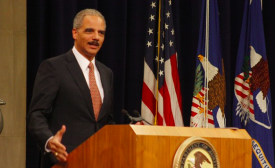united states
The American Studies Association is a relatively small professional association of scholars, but suddenly it has made an enormous impact on the public discussion of the Israeli-Palestinian conflict. On Dec. 16, the ASA endorsed an “academic boycott” of Israeli universities. It was a victory for what is known as the BDS (boycott, divestment, sanctions) movement, which began in 2005 but has been largely unknown in the United States until now.
Nearly eight months after President Hassan Rouhani's surprise election victory, in which the centrist cleric trounced influential conservative candidates, Iran's hardliners are behaving as if they never lost. Shadowy vigilantes on motorcycles have menaced the family home of a pro-Rouhani filmmaker, and reform-minded journalists are showing up on target lists.
India moved Friday to oust a U.S. diplomat from the American Embassy here, hours after the departure from the United States of an Indian consular officer who was asked to leave after she was indicted on charges of visa fraud. What appeared to be a tit-for-tat action may lead to a calming of the month-long dispute that has roiled U.S.-Indian relations.
It’s a new year for public diplomacy, and one that’s likely to be filled with opportunities and challenges. With this in mind, I have assembled a top 10 list for public diplomacy priorities for 2014. While by no means serving as a complete list of all the important issues facing U.S. public diplomacy, it is a reflection of the numerous discussions I have held with officials, practitioners, and academics over the past year.
In an escalating diplomatic fight, India has demanded that US diplomats adhere to the country's traffic rules. On Wednesday, the Indian government also ordered the US Embassy in New Delhi to stop selling liquor and other duty-free goods to non-diplomats by Jan. 16. The moves are the latest retaliatory measures taken by India following the arrest of Indian diplomat Devyani Khobragade on visa fraud charges in New York last month.
The heated debate surrounding NSA leaker Edward Snowden usually revolves around two extreme positions: Some consider him a hero and a whistle-blower worthy of clemency, while others consider his acts treasonous and believe he should be subject to the harshest punishment in our penal system. Ironically, that very same penal system makes getting Snowden back to the United States nearly impossible.

The heated debate surrounding NSA leaker Edward Snowden usually revolves around two extreme positions: Some consider him a hero and a whistle-blower worthy of clemency, while others consider his acts treasonous and believe he should be subject to the harshest punishment in our penal system.
Ironically, that very same penal system makes getting Snowden back to the United States nearly impossible.
2014 could be the year of public diplomacy, particularly throughout the Middle East where citizens continue to exercise enormous influence over the direction of events on the ground, from Iraq to Syria, and from Israel to the West Bank. Public opinion in the U.S. matters, as does public opinion “of” the United States around the world in an interdependent world.







